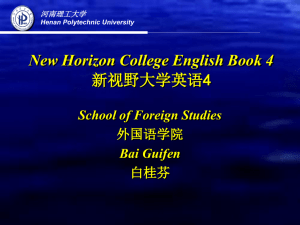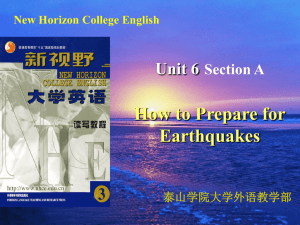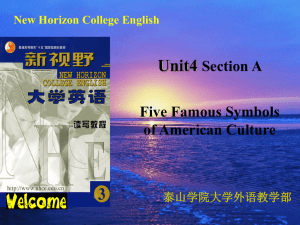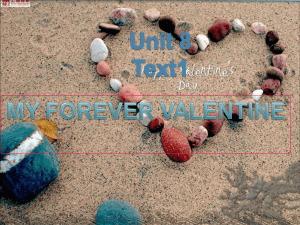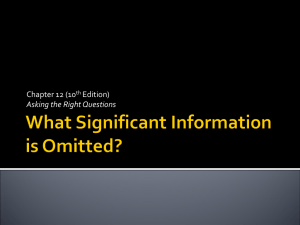第六章重在交际 - 精品课程
advertisement
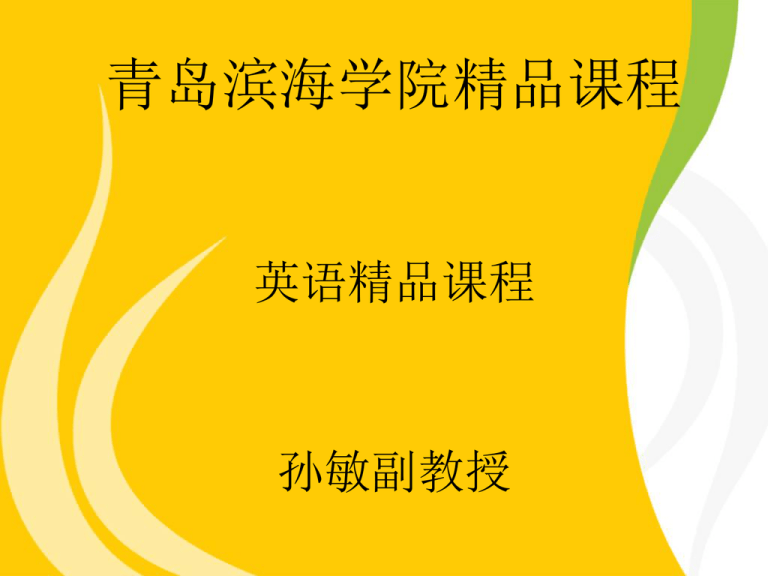
青岛滨海学院精品课程 英语精品课程 孙敏副教授 Part One 理论 第一节 转换 第二节 变通:增减词语 目 录 上一页 第三节 变通:改变句式 下一页 结束 第四节 诠释 2 第一节 转换 这里所说的转换,包括词类转换,语态转换 和正反转换 一、词类转换 目 录 上一页 下一页 词类转换旨在避免逐词死译或硬译,使译文 通顺自然。下面介绍几种常见的词类转换: 1.英语名词转译成汉语动词(名-动) 如: 结束 返 回 3 (1)The growing awareness by millions of Africans of their extremely poor and backward living conditions has prompted them to take resolute measures and create new ones 数以百万计的非洲人已逐渐意识到他们的 生活状况异常贫穷落后,这就促使他们奋起 采取坚决措施去创造新的生活条件 目 录 上一页 下一页 结束 (2) The turning point of my life was my decision to give up a promising business career and study music. 我的甚或转折点使我决定不再做生财有望 的商人而专攻音乐 4 (3) On one thing critics and fans agree: Wick is an authentic (真正的) American success story. 无论是批评家还是拥护者,有一个一致的看 法,既威克很能说明美国人是如何起家的。 2.英语介词转译成汉语动词(介-动)如: 目 录 上一页 下一页 结束 (1)It would not be easy to talk in general terms about western Europe as a unit, with its differences of climate and culture, its mountains, plains and coasts. 西欧诸国气候不同,文化各异,山峦、平原、 海岸各具特色,要想把西欧作为整体加以总 述,可不是一件容易的事。 5 (2) With unemployment high, the dollar low and the stock market in distress, the economy will be the President’s sternest trial. 失业增多,美元贬值,股票市场不景气,经 济问题将成为总统面临的最严峻的考验。 (3) He is a jovial (快乐的) giant, with a huge appetite for food, drink and women. 目 录 上一页 下一页 结束 他生性乐观,身材魁梧,贪吃贪杯又 贪色。 (4) The road to development is long but we are firmly on it. 发展的道路是漫长的,但我们已经坚 定地走上了这条道路。 6 3.形容词转化成动词 ( 1 ) We are not content with our present achievements. 我们不满足于我们现有的成就。 (2) They were suspicious and resentful of him. 我们不信任他,讨厌他。 (3) Hussein was a puzzled man. 候赛因茫然不解。 目 录 4. 副词转化成动词 上一页 (1) Class is over. 下一页 下课。 结束 (2) I was not in when you rang me. 你大电话时我不在。 7 5.动词转译成名词 ( 1 ) The landing was designed to cut the peninsula in two. 登陆的目的是要把该半岛一分为二。 (2) On that day they were escorted to the Great Wall of China. 目 录 上一页 下一页 结束 他们那天和陪同人员一道去游览了中国的长 城。 (3) A well dressed man, who looked and talked like an American, got into the car. 一个穿着考究的人上了车。他的外表和谈吐都 像美国人。 8 6. 形容词转译成名词 (1)They are going to build a school for the blind and the deaf. 他们将为盲人和聋人建一所学校。 (2) They showed a sympathetic understanding of our problem. 他们对我们的问题表示同情和理解。 7.名词转译成形容词 目 录 上一页 下一页 结束 (1)I recognized the absurdity of dealing with them through intermediaries. 我认识到,通过中间人和他们打交道是愚蠢的。 (2) He was still more surprised at the singularity of the stranger’s appearance. 他看到那个陌生人的外表非常古怪,就更加惊异了。 9 目 录 上一页 下一页 结束 8.名词用作表语形容词 (1)The garden-part is a great success. 游园会真实圆满极了。 (2) The music is a gas. 这音乐美妙极了。 9.名词转译成副词 (1)He had the kindness to show me the way. 他好心好意地为我指路。 ( 2 ) We found difficulty in solving the housing problem. 我们感到住房问题难以解决。 10.形容词与副词的相互转译 10 ( 1 ) He was deeply impressed by that they did in the critical moment. 他们在关键时刻的行为给他留下了深刻的印 象。 (2) “I suppose boys think differently from girls,” he said. 目 录 上一页 下一页 结束 “恐怕男孩的想法和女孩的想法是不一样 的。”他说。 (3) At last, he whispered a hurried good-bye to his host and darted toward the door. 最后,他匆匆向房东轻声道别,大步走向门 口。 11 11.非人称主语转换成人称主语 (1)The thought of returning to his native land never deserted him amid his tribulation(苦难). 在苦难中,重返故园的念头始终在他心头萦绕着。 (2)A look of pleasure came to her face. 她脸上露出愉快的表情。 目 录 上一页 下一页 (3) The design is foreign from my thoughts. 我头脑里没有这种打算。 结束 12 二、语态转换 英语和汉语都又主动句和被动句。英语句子的 被动含义有两种表示方法,一种有形式标志, 即助动词be+过去分词(+by);有一种没有形 式标志,仅靠句子在语义逻辑,用主动形式表 示被动含义。 目 录 上一页 下一页 结束 汉语表示被动的方法也有两种;一是“被” (或“受”、“挨”、“遭”、“给”、 “叫”、“让”、“为 ……所”、“被……所”等)字明显地表示被 动含义,这样的句子称为“被”字句;二是仅 靠句子的语义逻辑,用主动形式表示被动含义。 13 被动语态是英语中一种常见的语法现象。英 语中常用被动句主要是从施事原因,句法要 求,修辞考虑,文体的要求的需要。英文中 的科技文章,报刊文章和官方文章等正式文 体等常常使用被动句。相比较,汉语则稍用 被动态,因为“被”字可以多种方式化解掉。 英语被动结构有以下几种翻译方法: 目 录 上一页 下一页 结束 1. 被动式译成主动式 (1)It is stipulated that foreign investment in a joint venture shall not be, in general, less than 25% of the authorized capital. 按照规定,合资企业中的外资一般不得少于 额定资本总额的25%。(习惯语结构) 14 ( 2 ) A truly elegant taste is generally accompanied with excellency of heart. 真正的审美与心灵美是不可分的。 (3) In the afternoon rush of the Grand Central Station his eyes had been refreshed by the sight of Miss Lily Bart. 目 录 上一页 下一页 在中央火车站午后的旅客洪流中,他一眼瞥见 了丽莉·巴特小姐的身影,顿时觉得眼目清新, 精神为之一振。 2.被动句译成被动句 结束 15 ( 1 ) Close cooperation had been achieved almost as a last resort in the face of an immediate threat to their security, and once the enemy was defeated the differences in political outlook that had been temporarily overlooked inevitably reappeared. 上一页 密切合作是在他们的安全收到直接威胁的情况 下差不多作为最后手段才取得的,一旦敌人被 打败,那些暂时被忽略了的政治观点上的分歧 不可避免地重新出现了。 下一页 3.英语被动句译成汉语“把”字句 结束 ( 1 ) The tall building has been practically leveled to the ground by the big fire. 目 录 大火几乎把这座高大建筑物夷为平地。 16 (2)The question of forcible diversion of civil aircraft in flight was considered by the General Assembly of the United Nation as an important and urgent matter. 关于迫使飞行中的民航飞机调转航向的问题, 联合国大会把它当作一项重要而紧迫的议题 进行审议的。 目 录 4.英语被动句汉译成“是……的”结构 上一页 History is made by people 下一页 历史是人民创造的。 结束 5.英语被动句汉译成“由……” 17 Every country will be represented by its prime minister. 各国都将由总理代表。 6.当被动形式出现在英语不定式或分词或动 名词短语时,仍可酌情借用上述译法。 (1)They prefer to be assigned heavier tasks. 他们喜欢挑重担。 目 录 上一页 (2)In the 1960s, the rich and famous came to Rome to be wined, dined and clothed. 下一页 结束 20世纪60年代,阔佬和名流到罗马来寻找吃 喝穿。 18 (3)The virtue of a man ought to be measured not by his extraordinary exertions(努力), but by his everyday conduct. 人的品德不能看他一时格外买力,而要看他的 日常行为。 7.英语被动句译成汉语“为……所”被动句 目 录 上一页 下一页 结束 Mother is a sentimental(多愁善感的) woman. Her heart is good and easily moved by tears and frailty(脆弱). 母亲时个多愁善感的人,心地善良,容易为眼 泪和柔弱所动。 8.当被动形式出现在长句时,须根据上下文 作灵活翻译。 19 All the way along the line ,from the border right up to Peking, as far as the eye could see, the countryside was literally covered up with a green carpet of growing crops, holding a promise of bumper harvests. 上一页 从边境乘火车直上北京,一路上极目四望, 但见一片片农作物茁壮成长,仿佛绿色的地 毯覆盖着整个田野乡间,到处是丰收在望的 景象。 下一页 9. 英语主动句译成汉语“被”字句 结束 (1)They all succumbed (屈服)to temptation. 目 录 他们都被诱惑征服了。 20 (2)The jeweler’s was robbed last night, and the Reagans are under suspicion. 昨夜,珠宝行遭抢劫,里根夫妇乘了被 怀疑的对象。 请将下列文字译成汉语,注意被动语态的译法: 目 录 上一页 下一页 结束 One of the most famous monuments in the world, the Statue of Liberty, was presented to the United States of America in the nineteenth century by the people of France. The great statue, which was designed by the sculptor August Bartholdi, took ten years to complete. The actual figure was made of copper supported by a metal framework which had been especially constructed by Eiffel. 21 Before it could be transported to the United States, a site had to be found for it and a pedestal(底座) had to be built. The site chosen was an island at the entrance of New York Harbour. By 1884, a statue which was 151 feet tall, had been erected (矗立) in Paris. The following year, it was taken to pieces and sent to America. 目 录 上一页 下一页 结束 By the end of October 1886, the statue had been put together again and it was officially presented to the American people by Barrholdi. Ever since then, the great monument has been a symbol of liberty for the million of people who have passed through New York Harbour to make their homes in America. 22 目 录 上一页 下一页 结束 世界上最著名的纪念碑之一,自由女神像是法 国人民十九世纪时赠送给美利坚和众国的。这 座由雕塑家奥古斯塔·巴托尔德设计的巨大铜 像,用了十年功夫才造成。它的身体部分是用 铜制作的,支持身体的金属支架是由埃菲尔专 门制造的。在自由女神铜像运往美国之前,须 先找寻一个安放的地点,并建造一个垫座。所 选地点在纽约港进口处的一个岛上。到1884年, 这个高151英尺的雕像在巴黎建成。第二年, 雕像被拆卸成件运往美国。1886年10月以前, 雕像又拼装起来,并由巴托尔德正式赠予美国 人民。从那时起,这座巨大的纪念碑对于通过 纽约港来美国建立家园的亿万人们,一直是自 由的象征。 23 三、正反转换 正反转换即正说反译和反说正译的转换方法。这 样做的目的由三:(1)保证语义明确;(2)加 强修辞效果;(3)尊重汉语表达习惯,使译文 通顺易懂 1.保证语义明确 目 录 (1)正说反译 下一页 ① In the absence of a vaccine, how can HIV be stopped? 结束 如果没有疫苗,能否阻止爱滋病毒传播? 上一页 ② Her conduct is above reproach(责备). 她的行为无可指责。 24 ③ Politeness is not always the sign of wisdom, but the want of it always leaves room for the suspicion of folly. 虽然有礼貌并不一定标志着有智慧,但是无 礼貌却会使人怀疑其愚蠢 (2)反说正译 ① I’d go there as soon as not. 目 录 上一页 下一页 结束 我非常愿意去。 ② The mother gently disengaged her hand from that of her sleeping baby. 母亲小心翼翼地从熟睡的孩子手里抽出自己 的手来。 25 ③ I won’t keep you waiting long. 我一会儿就回来。 2.加强修辞效果 (1)正说反译 ① Mattie’s hand was underneath, and Ethan kept his clasped on it a moment longer than necessary. 目 录 上一页 下一页 结束 玛提的手在下,伊坦把他握住,没有立刻放 开。 ② Opportunity knocks but once. 机不可失,时不再来。 ③ That’s a thing that might happen to anyone 这种事情谁也难免。 26 (2)反说正译 ① Isn’t it funny? 真逗! ② Well, if this is not our old friend Mr. Smith! 啊,这绝对是史密斯先生,咱们的老朋友! 目 录 上一页 下一页 结束 ③ As I approve of a youth that has something of the old man in him, so I am no less pleased with an old man that has something of the youth. He that follows this rule may be old in body, but can never be so in mind. 我赞赏具有老年成熟风度的青年,而我同样 也称颂具有青年气息的老人。这样的人,只 有躯体会衰老,可思想永远年轻活跃。 27 3.尊重汉语表达习惯,保证译文通顺易懂 (1)正说反译 ① Mary lay awake almost the whole night. 玛丽躺在那儿,几乎一夜未合眼。 ② A new dignity crept into his walk. 他走起路来,不觉平添了几分尊严。 目 录 上一页 下一页 结束 ③ The claims mentioned above shall be regarded as being accepted if the Sellers fail to reply within 30 days after the Sellers received the Buyers’ claim. 若卖方收到上述索赔后30天未予答复,则认 为卖方已接受买方的索赔 (2)反说正译 28 (2)反说正译 ① Mr. Simpson, B. Sc., from Glasgow had not been our school master four winters for nothing. 那位来自格拉斯哥的理学士辛普森先生,在我 们这里当了四年教师,恐怕是有道理的。 ② “You will try to tide me over, won’t you?” “Won’t it?” 目 录 上一页 下一页 结束 “你会帮我渡过难关的,是吗?” “当然”。 ③ We never know the worth of water till the well is dry. 井枯方知水可贵。 29 请翻译下面的短文,注意正反表达 目 录 上一页 下一页 结束 For three years we had never spent Halloween without Father getting his nose broken. This experience took the fun out of Halloween parties in our family. Of course, people said that things always go by three’s, so there was no chance of its happening again. But alas! When Father jumped out of bed and started into the hall to answer the telephone, he ran into the partly open door, and broke his nose for the fourth time, and today is Halloween! 30 连续三年,我们过万圣节,父亲都碰破了鼻 子。这使我们万圣节的家庭聚会索然无味。 诚然,常言道,事不过三,因此,这类事情 不会再发生了。但是,天啊!当父亲匆忙跳 下床去厅里接电话时,一头撞到半掩的门上, 第四次碰破了鼻子。今天是万圣节哟! 目 录 上一页 下一页 结束 31 第二节 变通:增减词语 Part One 理论 一、增词 目 录 上一页 下一页 结束 增词是指在译文中增加某些原文中虽无其字但 有其意的词,一边更忠实通顺地表达原文的思 想内容。增词主要包括语义性增词、结构性增 词和修辞性增词。 (一)语义性增词 为了使译文语义明确,畅达通顺,符合汉语的 习惯,翻译中常根据意义上的需要增加动词、 名词、形容词、副词、量词、范畴词、概括词, 以及变式名词复数、动词时态等方面的词。如: 32 1.The first requisite of a good citizen in this Republic of ours is that he shall be able and willing to pull his weight. 要在我们这个共和国里当一个好公民,第一个必要的条 件便是他能够而且愿意尽自己的本分。 2 . They wanted a generation conditioned to loyalty and duty. of Americans 他们都希望把下一代美国人训练得忠于祖国,恪尽职守。 目 录 上一页 下一页 3 . Mary washed for a living after her husband died of acute pneumonia. 玛丽在丈夫患急性肺炎去世后,靠给人洗衣服维持生活。 结束 33 4.All empty souls tend to extreme opinion. 内心空虚的人容易走极端。 5.The grief of the people took charge. 人民的悲痛情绪失去了控制。(增补名词) 6.In this mood, I went to diplomatic circles, earnest but only sketchily informed. 目 录 我就是带着这种心情进入外交界的。满腔热情, 但是知识肤浅得很。(增补形容词和副词) 上一页 下一页 结束 7.We have achieved rapid progress in industry, agriculture, commerce, education and culture.我 们在工业、农业、商业、文化教育各方面都取 得了迅速发展。(增加概括性词语) 34 7.We have achieved rapid progress in industry, agriculture, commerce, education and culture.我 们在工业、农业、商业、文化教育各方面都取 得了迅速发展。(增加概括性词语) 8.Chen is thirty-two and mother of two. 陈今年32岁,已是两个孩子的母亲。(增加概 念词) 目 录 上一页 下一页 结束 9.A stream was winding its way through the valley into the river. 一湾溪水蜿蜒流过山谷,汇合到江河里去了。 (增加数量词) 35 10.The very earth trembled as with the tramps of horses and murmur of angry men.大地都震动 了,仿佛万马奔腾,千军怒吼。(增加显示复 数的修饰词语) 目 录 上一页 下一页 结束 36 目 录 上一页 下一页 结束 请口译下述词和词组: 1. pocket veto 搁置否决权 2. returning officers 负责选举的官员 3.nodding acquaintance 交往不深的熟人 4. a powered face 一张擦过粉的脸 5. a revoked license 被依法吊销了的执照 6. ghost town 被遗弃的城镇 7. a seesaw match 不分胜负的长时间比赛 8. bird dog 捕鸟猎狗 9. passenger liners 定期客轮 10. stopping measures 权宜之计 37 (二)结构性增词 省略是英语的一大特点。汉译时往往要按 照句法上的需要补译英文中省略的各种成分, 才能使译文句子意思完整,表达通顺。这种按 句法需要而增词的译法称作结构性增词。如: 1. This is as true of nations as it is of individuals. 目 录 个人是这样,国家也是这样。 上一页 2.A fool and his words are soon parted; a man of genius and his money. 下一页 结束 愚人会很快忘记说过的画,智者会很快放弃手 里的钱。 38 3.Saving is to an individual is what profit is to a business. 一个人不能不储蓄,就像一个企业不能没有 利润一样。 4. Association with the good can only produce good, with the wicked, evil. 近朱者赤,近墨者黑。 目 录 上一页 下一页 结束 5.I walked the unemployment lines the other day to talk to this American. It is depressed, pained and bewildered. But not self-pitying. 前几天,我走到失业人员排成的长队中,找 这类美国人谈话。他们垂头丧气,内心痛苦, 不知所措。但是,他们并不顾影自怜。 39 (三)修辞性增词 目 录 上一页 下一页 修辞性增词大都出于译文行文上的考虑,因此, 修辞性增词往往出现在译者推敲、校正和润饰译 文行文的过程中,而且所增加的词往往是不改变 原文词句意思的语气补足词、强调性副词或其他 修辞上所需要的词汇。其中,为了使译文明确、 强调或生动而重复一些关键性的词,也被视为修 辞性增词。(即:修辞性增词包括增加语气词和 关键词的重复)如: 结束 40 1.Don’t take it seriously. I’m just making fun of you. 不要当真嘛!我不过是开开玩笑 罢了 。(增加 语气词) 目 录 上一页 下一页 结束 2 . Crafty men contemn studies, simple men admire them, and wise men use them; for they teach not their own use; but that is a wisdom without them, and above them, won by observation. 有一技之长者鄙读书,无知者羡读书,惟明 智之士用读书,然并不以用处告人,用书之 智不在书中,而在书外,全凭观察得之。 41 3.For men and women are not only themselves; they are also the region in which they are born, the city apartment or the farm in which they learnt to walk. 因为不论男男女女,都不仅仅是他们自身, 他们也是自己出生的乡土,学步的农场或城 市公寓。 上一页 4.He deserves not the sweet that will not taste the sour. 下一页 不吃苦中苦,难得甜上甜。 结束 请翻译下述词语和句子,注意语义性、结构 性和修辞性增词: 目 录 42 1.What is feared as failure in American society is, above all, aloneness. And aloneness is terrifying because it means that there is no one, no group, no approved cause to submit to(呈交). 目 录 上一页 在美国社会中作为失败而为人们所恐惧的, 莫过于孤独了。而孤独之所以可怕,就是因 为那意味着没有一个可服从的人,没有一个 可服从的团体,也没有一个可服从的公认的 大义。 下一页 结束 43 2.But, if this world is not merely a bad joke, life a vulgar (平庸的)amid the cool radiance of the stars, and existence an empty laugh braying across the mysteries; if these intimations of something behind and beyond are not evil humour born of indigestion, or whimsies(怪念头) sent by the devil to mock and madden(使发狂)us; if, in a word, beauty means something, yet we must not seek to interpret the meaning. 目 录 上一页 下一页 结束 但是,即使现实世界不仅仅是一个拙劣的玩笑,生命不 仅仅是星体间交织的寒光中的一点平庸的火花,人生也 不仅仅是喧噪于神秘之乡的空虚的一笑;即使这一切发 自那既不可望又不可及的某种事物的启示不是由于内在 的失调而迸发的邪异之念,也不是魔鬼用来嘲弄和激怒 我们的奇思怪想;一句话,即使美确实具有某种意义, 我们还是不要试图去解释它的意义为好。 44 3.To spend too much time in studies is sloth; to use them too much for ornament, is affectation; to make judgment wholly by their rules, is the humour of a scholar. 读书费时过多易惰,文采藻饰太盛则矫,全凭 条文断事乃学究故态。 目 录 上一页 下一页 结束 4. Bowling is good for the stone and reins; shooting for the lungs and breast; gentle walking for the stomach; riding for the head; and the like. 打保龄球利睾肾,射箭利胸肺,漫步利肠胃, 骑术利头脑,诸如此类 5. Science demands of men effort and complete devotion. 人们要掌握科学,必须勤奋、献身。 45 二、省略 省略,是指不译出原文的某些词的意思。正如 增词不是随意增加原文的意思一样,省略也不 是要删去原文的意思,而是省去那些在译文中 不言而喻的字词,或省去那些译出来反而累赘 或不符合汉语表达习惯的词语。 目 录 上一页 下一页 结束 省略,主要是出于句法上的需要或是出于修辞 上的需要。 (一)句法性省略 1.省略代词 (1)省略人称代词 46 指代关系明确,一般每个句子都有主语和谓 语,或有时要有宾语,这是英语句法所要求 的,而汉语的表达习惯则往往在指代关系明 确的情况下,几个谓语借用上下文提到的一 个共同的主语,不必一个一个地重复。因此, 作主语的人称代词汉译时往往省略。同样道 理,作宾语人称代词也是如此。如: 目 录 上一页 下一页 结束 ① When I arrived I was surprised to see that it was a party of considerable distinction. I giggled to myself. 我到了(……)一看,没料到都是些相当出 色非同一般的人士,禁不住暗自一笑。 47 ② Give him an inch and he’ll take an ell. 得寸 进尺。 ③ The further one goes the further behind. 南辕北辙,背道而驰。 (2)省略物主代词 目 录 上一页 下一页 结束 与汉语相比,英语多用物主代词。汉 译时往往按照汉语的表达习惯,省略物主代 词。 如: ① In my childhood I learned a great deal about Russia. 童年时,我就听到许多关于俄国的事情。 48 ② All the other fellows gathered around, stretching their necks like geese. 其他的人全围上来,(……)脖子伸得跟鹅 似的。 ③ To widen your life without deepening it is only to weaken it. 拓宽而不加深生活,只能削弱生活。 目 录 上一页 下一页 结束 (3)省略非人称代词 用来表示时间、天气、自然环境或距离的非 人称代词it, 用来代替不定式短语或从句作形 式主语的先行代词,以及强调式中的it,汉语 时往往省略。如: 49 ① It was a bitterly cold night and at ten o’clock it began to blow a gale. 那是一个寒风刺骨的夜晚10垫钟时,大风骤 起。 ② It’ll be lovely in the garden tonight. 今晚的游园会将是十分宜人的。 目 录 上一页 ③ It was not until deep at night that they came back. 他们直到深夜才回来。 下一页 结束 实践 3.省略连词 (1)并列连词and 和or有时可以不译出。如: 50 ① No man can be brave who considers pain the greatest evil of the life; or temperate ( 节 制 ) , who regards as the highest good. 把痛苦视为生活最大不幸的人不可能勇敢; 把欢乐当作生活最高追求的人不会自我节制。 ② All I am, or can be, I owe to my angel mother. (A. Lincoln) 目 录 上一页 下一页 结束 实践 我之所有,我之所能,都归功于我慈爱的母 亲。 ③ Wise men love truth, whereas fools shun it. 智者热爱真理,愚者逃避真理。 51 (2)省略从属连词。汉语中的连词不如英语 用得多。其上下逻辑关系常常是案含的,由 语序加以体现。因此,汉译时,英语中表示 原因、条件、或时间的从属连词有时可以省 略。如: ① Because everyone uses language to talk, everyone thinks he can talk about language. 目 录 上一页 下一页 结束 实践 人人都用语言交谈,人人也就自认为能够谈 论语言。 ② If a country has an abundance of natural resources, it is common for it to export some of them. 一个国家的自然自愿十分丰富,出口一些自 愿是微不足道的。 52 ③ As the police put it, anything you say may be used as evidence against you. 警察常说,你说的每一句话都可能会成为对 你不利的证据。 3.省略冠词 目 录 上一页 下一页 结束 冠词是英语有而汉语所没有的词类。一般说 来,除了带有明显指示意义的定冠词和含义 明显的“一个”或“每一个”意思的不定冠 词不能不译外,其他情况一般可以省略不译。 请将下段文字译成汉语,并对冠词的译法作 出说明。 实践 53 One a cold, frosty day an Ant was dragging out some of the corn which he had laid up in the summer-time, to dry it. A Grasshopper, had perished with hunger, besought the Ant to give him a morsel of it to preserve his life. “What were you doing, ” said the Ant, “this last summer? ” “Oh,” said the Grasshopper, “I was not idle. I kept singing all the summer long,” said the Ant, laughing and shutting up his granary, “Since you could sing all summer, you may dance all winter.” 目 录 上一页 下一页 结束 实践 一个霜冻的冷天,一只蚂蚁拖出夏天储存的一些谷子 来晒。一只饿得半死的蚱蜢恳求蚂蚁给它一口谷子来 维持它的生命。蚂蚁说:“你今年夏天干什么来着?” 蚱蜢说:“哦!我并没闲着,我唱了一夏天的歌。” 蚂蚁关起谷仓笑着说:“你既然能唱一夏天的歌,那 么你也可以跳一冬天的舞喽。 54 4.省略介词 介词的译法比较复杂,有的要译成汉语的动 词词组、介词词组、定语或状语词组,有的 要译成否定式或汉语成语等,还有的可以省 略。一般说来,如果译文中将表示时间或地 点的介词短语所充当的状语置于句首,此时 介词往往可以省略不译。如: 目 录 上一页 下一页 结束 实践 In the morning he was awakened by the noise from beyond his window. It was just seven, yet when he looked outside he saw the beach already swarming with people. 早晨,她被窗外的吵闹生惊醒,才7点,不过 向外一瞧,海滩上已经人山人海了。 55 (二)修辞性省略 1.省略不言而喻的词 ① Stainless steels possess good hardness and high strength. 不锈钢硬度大,强度高。 目 录 上一页 下一页 结束 ② Slow and careful cooking of meat makes it more digestible and assists in the breaking down of the protein content by the body. 精心炮制、慢火烹调可使肉食易于消化,并 有助于人体分解蛋白酶。 实践 56 ③ These uses are based on the fact that silicon is semi-conductor of electricity. 这些用途乃基于硅是半导体。 2.省略重复的名词 英语中,有些同义词往往连用,或表示强调, 或对前面的词提供意思上的解释;汉译时, 为了避免重复,译出其中的一个即可。如: 目 录 上一页 下一页 结束 实践 ① The mechanical energy can be changed back into electrical energy by means of generator or dynamo. 用发电机把机械能转变成电能。 57 ② Our commander guarded it (the newspaper) like the apple of his eye. 我们的司令员护着那张报纸,正跟护着他的 眼珠子一样。 3.省略为了语气关系而多加的副词或连词, 如:so, then. And then等。如: ① She came to the dining-room window and then cautiously looked in. 目 录 上一页 下一页 结束 实践 她来到餐厅窗前,小心翼翼地向里观看。 ② I had broken my glasses, so I couldn’t see what was happening. 我把眼镜打破了,没能看清当时正在发生的 事情。 58 ③ “Remember: you are not any old Tom, Dick or Harry giving his opinion. You’re a man who was sent as a representative of the British Government.“ 目 录 “你要记住,你不是一个普普通通的老百姓, 可以随便发表意见。你是英国政府派出来的 代表。 上一页 下一页 结束 实践 59 第三节 变通: 改变句式 一、关系从句 关系从句的主要句法功能是作定语,起修饰 限制先行词的作用。在这种情况下,可以按 其语法功能将其译为汉语的定语。如: ① A person who is a Jack of all trades has many skills. 目 录 上一页 一个被成为“万金油”的人是一个掌握了许 多技能的人。 下一页 结束 实践 60 ② The root is that part of the vegetable which least impresses the eyes. 根是植物最不引人注目的部分。 ③ Those virtues which characterize the young English gentlewoman, those accomplishments which become her birth and station, will not be found wanting (欠缺的) in the amiable Miss Sedley. 目 录 上一页 下一页 结束 举凡英国名门之女所应有的品德特征,凡与 其家世和地位相匹配的造诣,今在令媛赛特 莉小姐身上无不一一具备。 关系从句除了起定语作用以外,还有其他的 语法功能,这就需要选择合适的翻译方法, 予以变通。 61 1.译成独立句 目 录 上一页 下一页 结束 实践 (1)Both oil and natural gas are transported in pipelines which stretch for hundreds of miles from the oil fields to where the materials are to be used. If your city uses natural gas, whenever you turn on a gas burner, you open a pipe whose other end may go down into the ground a thousand miles or more away. 石油和天然气都用管道输送,这种管道从油 田到使用地点长达数百英里。如果你所在的 城市使用天然气,那么,每当打开气炉时, 你就启用了一条管子,它的另一端可能在一 千里以外或更远的地下。 62 ( 2 ) Being reluctant to think, unwilling to study intensively and understand deeply and being complacent and satisfied at insignificant knowledge all are the causes of poor intelligence, which can be termed as “foolish”. 目 录 懒于思索,不愿认真钻研和深入理解,自满 和满足于微不足道的知识,这些都是智力贫 乏的原因。这种智力贫乏可以称为“愚蠢”。 上一页 2.融合法 下一页 当关系从句与主句或向行刺关系比较密切时, 可以把从句压缩为短语,与主句或先行词融 合在一起翻译。如: 结束 实践 63 (1)We look forward to the day when the scientists can discover more secret of the universe. 我们期待着有一天科学家们能解开更多的关 于宇宙的奥秘。 目 录 上一页 下一页 结束 (2)It was an old woman, tall and shapely still, though withered by time, on whom his eyes fell when he stopped and turned. 他站住,转过身来,定眼一看,原来是个年 迈的妇人,她身材修长,虽然岁月的折磨使 她显得有点憔悴,但风韵犹存。 实践 64 (3)He who is jealous and cannot achieve anything great himself tries every means to devaluate(贬低) and belittle other’s greatness to his status. 有嫉妒心且又干不成任何大事的人,正是千 方百计地估计和贬低他人的了不起,使之降 低到他自己那种高度的人。 目 录 3.状语化法 上一页 当关系从句含有状语意义时,可以译成表示 时间、地点、原因、结果、目的、让步、条 件、假设等逻辑关系的转于或状语分句。如: 下一页 结束 实践 65 (1)The Security Council passed a resolution on enforcing economic sanctions upon Iraq, which extends support to Kuwait in safeguarding its sovereignty. 安理会通过了一下功经济制裁伊拉克的决议, 旨在支持科威特捍卫自己的主权。(表目的) 目 录 上一页 下一页 结束 ( 2 ) A serious earthquake took place in northwest China last week which caused heavy losses of property. 上周中国西北地区发生了强烈地震,造成严 重的才称损失。(表结果) 实践 66 (1)The Security Council passed a resolution on enforcing economic sanctions upon Iraq, which extends support to Kuwait in safeguarding its sovereignty. 安理会通过了一下功经济制裁伊拉克的决议, 旨在支持科威特捍卫自己的主权。(表目的) 目 录 上一页 下一页 结束 ( 2 ) A serious earthquake took place in northwest China last week which caused heavy losses of property. 上周中国西北地区发生了强烈地震,造成严 重的才称损失。(表结果) 实践 67 ( 3 ) A man who wishes to make fewer mistakes must be diligent in learning dialectical materialism and courageous in taking part in actual practice. 要想少犯错误,就必须勤于学习辨证唯物主 义,勇于参加实践。(表假设、条件) 目 录 上一页 下一页 结束 实践 (4) These methods are quick fixes that do not get to the root of the problem. 这些方法虽然有速效作用,但不能从根本上 解决问题。(表转折) 请口译下列各句: 68 (1) It happened in one of those picturesque Danish taverns that cater to tourists and there English is spoken. 故事发生在丹麦的一家美丽如画的小旅社里。 这种旅社备有酒食招待游客,通用英语。 目 录 上一页 下一页 结束 实践 69 (2) But how should he (Hitler) die? To shoot or hang him seemed too quick, too merciful. Then someone uttered what was in everybody’s mind: the man who had caused incredible suffering should be burned to death. 目 录 上一页 可怎么个死法?枪毙了吧,上绞架吧,都未 免死得太快,太便宜了他。后来,不知是谁 说出了大家的心里话:此人造成的苦难叫人 简直没法相信,应该把他烧死。 下一页 结束 实践 70 (3) The Iraqi authorities try in vain to turn a deaf ear to the UN economic sanction which would eventually produce enormous impact upon the former’s politics and economy. 伊拉克当局妄图无视联合国的经济制裁,尽 管经济制裁必将对伊拉克的政治经济产生巨 大的影响。 目 录 上一页 下一页 结束 实践 (4) Those who make their dress a principal part of themselves, will, in general, become of no more value than their dress. 谁若把衣服当成自身的基本要素,一般说来, 他们就不会比衣服更有价值。(表假设) 71 (5) He is the happiest, be he king or peasant, who finds peace in his home. 无论是国王还是农夫,家庭和睦是最幸福的。 (表条件) 二、状语从句 1.When引导的状语从句 目 录 上一页 下一页 结束 实践 when 作连词可以引导多种状语从句,翻译时 应根据其功能和意义,选择正确、流畅的汉 语表达。 (1)时间状语从句 在翻译when引导的时间状语从句时,切忌不 假思索地一律以“当……的时候”的句式套 用,要根据具体情形灵活处理。 如: 72 ① He became talkative when it came to his singles. 一提到他的单曲他便滔滔不绝起来。 ② He was on the verge of losing his temper with his wife, when she uttered a cry. 他正要对妻子发脾气,忽听她喊叫起来。 目 录 上一页 下一页 结束 实践 ③ Business is pretty slack(淡季的), to begin with, and then I’m fixing up a little house for Ned and Ruth, when they’re married. 一来生意清谈,一来我正预备给纳德和路思 盖个小房子,他们快要结婚了。 (2)原因状语从句和让步状语从句 73 when引导的状语从句除表“时间”以外,有 时 还 表 示 原 因 或 让 步 , 相 当 于 “ since” 或”although”,翻译时应区别对待。 如; ① Why tell lies when you know the truth? 既然知道事实真相,为什么要说谎呢? ② He just stood there with his arms folded when he might have given me a hand. 目 录 上一页 下一页 他本可以帮我一把,却偏偏只是站在那里袖 手旁观。 (3)条件状语从句 结束 实践 Don’t forget to write to me when you have time. 如果你有时间,别忘了给我写信呀。 74 2.before 引导的状语从句 (1)时间状语从句 before可以引导时间状语从句,意为“在…… 之前“。由于中国人习惯于按照事物发展的 先后顺序进行表达,所以翻译时可以把before 引导的时间状语从句的先后顺序进行调整。 如: 目 录 上一页 下一页 结束 实践 ① Be a pupil before you become a teacher. 先做学生再做先生。 ② Get the lion out of here before it escapes and eats somebody. 趁狮子还没有逃出去咬人,快把它弄走。 75 ③ I had scarcely entered the classroom before the bell rang. 我刚进教室,铃就响了。 (2)让步状语从句 before 引 导 让 步 状 语 从 句 , 相 当 于 “ rather than”,意为”与其……”. 如: They would fight to death before they surrender. 目 录 上一页 下一页 结束 实践 他们宁死不屈。 (3)条件状语从句 before引导条件状语从句,意为“只有…… 才……”。如: 76 You have to pay out fifty dollars in cash before they’ll give the toy gun to you. 你只有付出50 美金,他们才会把那只玩具枪 给你。 请翻译下列各句,注意before 的确切含义和 译法。 目 录 上一页 下一页 ( 1 ) A dozen ideas were considered and rejected before he finally hit on the plan. 十几个想法都被考虑过之后否决了,最后终 于想到了这个方案。 结束 实践 77 (2)The next moment, before he had time to realize what was happening, he was hit over the head. 说时迟那时快,还没有等他明白过来是怎么 回事,头上就挨了一击。 (3) You have to finish doing your take-away exercises before you can go out and play. 做完课后练习才能出去玩。 目 录 上一页 下一页 结束 实践 (4) He would die before he suffered dishonor. 他宁死不受辱。 三、名词性从句名词性从句可以在句中作主 语、宾语和表语。翻译名词性从句常见的有 以下几种方法: 78 1.可按原文的句序译成相应的汉语。如: Whatever is worth doing at all is worth doing well. 凡是值得做的事,就值得把它做好。 2.遇到以it作形式主语而将真正的主语置后 的句型,翻译时可采用分译、合译或插译的 方法。 目 录 上一页 下一页 结束 实践 如: (1)It can be seen that pre-cleaning alone would not reduce the total sulfur content of the four coals to level anywhere near the standards. 可以看出,这4种煤的总含硫量仅靠预洗是不 能降低到接近标准规定的水平的。(分译) 79 (2)It doesn’t matter whether we start now or later. 我们现在 开始还是 以后开始 都没有关 系 。 (合译) (3)It happened that I had bought the book. 我碰巧买了这本书。 3.改译成词组。 如: 上一页 (1)Show me the man you honor, and I will know what kind of a man you are. 下一页 把你尊敬的人告诉, 我就知道了你的 目 录 结束 为人。 实践 (2) It is no use crying over spilt milk. 覆水难收。 80 (3)To know a thing, what we call knowing, a man must first love the thing. 要真正那个认识一个事物,必须首先 爱它。 目 录 上一页 下一页 结束 实践 81 第四节 诠释 Part One 理论 下一页 诠释,即文化诠释,是在处理英汉两种语言的诸多 差异,尤其是文化差异时所采用的对策之一,是以 实现语言交际功能为目的的翻译方法之一。中国与 西方社会在生态、地域、物质、社会、宗教、语言 等诸方面既有不同点,也有相同、相通或相似点。 当出现不同时,可用诠释法;当出现相同、相通或 相似点时,可采用保留法。 结束 一、保留法 目 录 上一页 实践 所谓保留法,即保留源出语的文化特征或民族特色。 如: 82 1.I wouldn’t work for that. It’s chicken feed. 给这点钱我不干。我才不去刨那点儿鸡食儿 吃呢! 2 . More and more soap operas are widely received. 越来越多的肥皂剧收到观众欢迎。 目 录 上一页 下一页 结束 实践 3.Smashing a mirror is no way to make an ugly person beautiful, nor is it a way to make social problems evaporate. 砸破镜子不能使丑八怪变漂亮,也不能使社 会问题烟消云散。 83 二、诠释法 所谓诠释法,即在源出语的文化特性、民族 特色难以完全或直接保存时,或者无法直译 时,所采取的对策。 目 录 上一页 下一页 结束 实践 诠释法是针对文化差异性而采取的一种广泛 意义的变通译法,是为了实现翻译的主要意 图—文化交流和沟通,使译文读者更迅速、 更准确地理解原文作者的话语意义,防止因 “形”害“意”的现象发生。 (一)为避免意义错误和语义空缺而诠释 1.Yesterday John received a Dear John letter and a pink slip almost at the same time. 昨日,约翰几乎同时收到一封绝情信和一份 解雇通知。 84 2. She is a lady of blue blood. 她出身高贵。 3.You mind your p’s and q’s! 你要谨慎小心点! 4.She plays the role of Mercury between the two lovers. 她是那对恋人的“传书使者”。 目 录 上一页 下一页 结束 实践 (Mercury 是希腊神话中的风神。由于她来去 如飞,所以兼任了天国的传书使者,常替诸 神传送信息。 5 . The negotiations are the key to the undertaking; we’d better ask Mumford to carry the ball. 85 6. What he said is but a cock-and-bull story. 他的化只不过是拙劣的谎言。 7.You can’t have your cake and eat it too. 鱼和熊掌两者不可兼得。 8. He was the first European head of state to visit their country, and they rolled out the red carpet for him. 目 录 上一页 下一页 结束 实践 他是第一位对他们国家进行访问的欧洲国家 元首,所以为他举行了隆重的欢迎仪式。 (二)为避免意义晦涩和引起歧义而诠释 1.I look down upon him, for he’s a soft-soaper. 我瞧不起他,马屁精! 86 2.Lets sleep on it. 这事明天再说吧。 3.I was too much of a chicken to fight. 我太胆小了,不敢打仗。 4.You look darker after the holidays. 你度假回来,看上去更健美了。 目 录 上一页 下一页 5 . He was given a few headline-grabbing assignments. 他得到几次出风头的差事。 结束 实践 87 (三)诠释要考虑文体对等 目 录 上一页 下一页 结束 实践 语言除了传递某种意义外,还具有一定的文 体色彩,或繁或简,或雅或俗,或庄重或诙 谐,或平铺直叙,或委婉曲折。因其文体色 彩不同,给读者的感受也就不同。翻译追求 译文读者与原文读者有相同或相似的感受, 所以译文文体应与原文文体大致一致,以追 求语言在此种环境下特殊的交际功能。如: 1. “Mine is a long and sad tale!” said the Mouse, turning to Alice, and sighing. 那老鼠对着爱丽丝叹了口气道:“唉,我的 历史说来是有长又苦又委屈呀!“ 88 “It is a long tail, certainly,” said Alice, looking down with wonder at the Mouse’s tail, “but why do you call it sad?” 爱丽丝听了,瞧着那光滑的尾巴说:“你这 尾巴是长,可是为什么苦呢?” “… You had got to the fifth bend, I think?” “……你说到第五个弯了,不是吗?” 目 录 上一页 下一页 “ I had not!” cried the Mouse, sharply and very angrily. 那老鼠很凶很怒地道:“我没有到!” 结束 实践 89 “A knot!” said Alice, “Oh, do let me help to undo it.” 爱丽丝道:“你没有刀吗?让我给你找一 把罢!” 分析:译者为了追求与原文类似的诙谐效果, 对“tale”, “tail”和 “not”, “knot” 目 录 上一页 下一页 两对谐音作了十分灵活而巧妙的处理, 译文生动、幽默、自然。 2. SOS— Save Our Souls; Wear X X Spectacles. 紧急呼吁:戴上眼睛,拯救灵魂之窗! 结束 实践 90 分析:这是一句巧妙的广告词。不说 Save our eyes,而说Save our souls,因为常言道:The eye is the mirror of the soul.此译文用“灵魂之窗”回喻 “眼睛”,意味隽永。 三、注释法 目 录 上一页 下一页 结束 实践 注释法是一种特殊的诠释。有时为了兼 顾介绍异域文化和保证翻译的交际效果,可 采取直译加注释的方法,其优点主要有两个: (一)可以使译者比较从容地交代相关的文 化背景知识。如: 91 The May-day dance, for instance, was to be discerned on the afternoon under notice, in the disguise of the club revel or “clubwalking”, as it was there called. 譬如现在所讲的那个下午里,就可以看出五 朔节舞①的旧风以联欢会的形式出现。 目 录 上一页 下一页 结束 实践 ① 五朔节舞:英国风俗,5月1日奏乐吹号, 采撷(xie)树枝、野花装饰门窗。在草地 上竖立五朔柱,围柱跳舞,并选举五朔后, 此风古时极盛,现在穷乡僻壤还有举行的。 (二)可以用来处理一些特殊的文字修辞。 92 在遇到双关、谐音、拆字合字等修辞手法时, 如果译者无法在译文正文种将所有的方面都 表现出来时,可以只译其主要意义,再用注 释法将其他意义和风格特征作一补充说明。 如: “Why is the river rich?” “Because it has two banks.” 目 录 “为什么河流是富裕的?” 上一页 “因为它有两个银行啊!” 下一页 结束 实践 (注:原文bank 是双关:一指河岸,二指银 行。) 93 请试译下文: 目 录 上一页 下一页 结束 实践 A college professor was one day nearing the close of a history lecture and was indulging in one of those rhetorical climaxes in which he delighted when the hour struck. The students immediately began to slam down the movable arms of their lecture chairs and to prepare to leave. The professor, annoyed at the interruption of his flow of eloquence, held up his hand: “Wait just one minute, gentlemen. I have a few more pearls to cast.” 94 一天,一位大学教授正上历史课。课近尾声, 他的授业情绪业趋向高潮。这叫做修辞学上 的“渐进法”,他正高兴地想着,不巧下课 铃响了。立即,学生们开始放下座椅的活动 把手,收拾书本准备离开,砰然之声此起彼 伏。 目 录 上一页 下一页 结束 实践 教授口若悬河正讲得起劲,见此情景非常不 悦,于是扬起手说道:“稍等稍等,诸(猪) 先生。方才丢了好些珍珠,索性全丢给你们 算了!” (注:最后一句出自圣经的典故。《马太福 音》第7章第6节写道: 95 不要把圣物给狗,也不要把你们的珍珠丢在 猪前,恐怕它践踏了珍珠,转过来咬你们。 Give not that which is holy unto the dogs, neither cast ye your pearls before swine(猪), lest they trample them under their feet, and turn again and rend you.) 目 录 上一页 下一页 结束 采用诠释法进行翻译,有时可以根据译文的 语义、语法或修辞上的需要,改变原文的标 点符号。例如本节所举的赵元任的译例就多 处采用例转换标点符号的译法,从而确切地 反映了爱丽丝的惊讶、疑问或急切的心情。 实践 96 实践练习 实践一 实践二 目 录 上一页 实践三 下一页 结束 实践四 97 Part Two 翻译实践练习 一 一.把下列句子译成汉语,注意斜体词的词类 转换: 1.Every man is a fool sometimes, and none at all times. 一个人只能有时傻,不能总是傻。 目 录 上一页 下一页 结束 2.He stood watching her go down the street with a slow, self-satisfied sway of her body. 他站在那儿,望着她慢吞吞地、自鸣得意地扭 着身子,沿街而去。 实践 98 3.There is a limit to one’s youth, but no limit to his wisdom. Draw on the limitless wisdom during the short span of youth. 青春是有限的,智能是无穷的,趁短暂的青 春,去开拓无穷的智能。 4.In the British system, a parliamentary election also determines who separate election of President and Congress. 目 录 上一页 下一页 结束 实践 按照英国制度,议会选举可决定首相人选, 但美国宪法规定总统选举和国会选举分开 进行。 5.To a crazy ship all winds are contrary. 对于一只摇摆不定的船只来说,不论什幺方 向的风都是逆风。 99 把下列各句译成汉语,注意语态的转换: 1.Such conduct will be looked down upon ay all with sense of decency. 这种行为将为所有具有良知的人所蔑视/不耻。 目 录 2.Illnesses must be correctly diagnosed before they can be treated with medicine. 上一页 疾病必须先有正确诊断,才能用药加以治疗。 下一页 3.Principles mean very little unless they are acted up. 结束 原则如不加实施就没有什么意义了。 实践 100 4.At every step the child should be allowed to meet the real experience of life; the thorns should never be plucked from his roses. 每一步都应该允许孩子真正体验生活,决不 要拔掉他的玫瑰刺儿。 5.their friend ship was turned to enmity through idle gossips. 目 录 流言蜚语使他们之间的友情变成了怨仇。 上一页 下一页 结束 实践 101 三.将下列各句译成汉语,注意正反、反正表达: 1.She earns a good salary, so she shouldn’t be badly off. 她薪水不低,不应该很拮据。 目 录 上一页 下一页 结束 2.Unless it goes hand in hand with science, democracy will have no future. 民主只有和科学携手并进才会有前途。 3.To be poor and independent is very nearly an impossibility. 贫穷而又不依靠他人几乎是不可能的。 4.Let bygones be bygones. 既往不咎。 102 6.A lot of the household’s in informal society was conducted over the stove.这家人经常地与客 人围炉而坐。 7.It was a good story, but a little confusing. You missed out somewhere on the facts.这篇报道 不错,但有点让人弄不明白。你几乎漏掉 了某些实情。 目 录 上一页 下一页 结束 8.A bird in the hand is worth two in the bush..双 鸟在林,不如一鸟在手。 9.This problem can never be taken too seriously. 这个问题无论怎样对待都不过分。 10Don’t be afraid of calling a spade a spade even when it comes to your boss. 即使涉及你的老 板,也要敢于实话实说。 103 Part Two 翻译实践练习 二 一.将下列句子译成汉语,注意斜体部分的 增词: 1. 目 录 上一页 下一页 The V sign itself is a challenge, for the famous Churchillian invention that used to mean Allied Victory is no longer valid. V 形手势语本身就是挑战,因为丘吉尔的 这个著名的发明当年曾作为盟军胜利的 标志,但现在已经过时了。 结束 实践 104 2. He made sincere apologies to each of the teacher. 他向每位老师一一道歉,态度很诚恳。 3.“Impossible” is a word to be found only in the dictionary of fools. “不可能”这个词只在蠢人的词典里才能找 到。 目 录 上一页 下一页 结束 实践 4. We have no more right to consume happiness without producing it than to consume wealth without producing it. 如果我们不创造幸福,我们就无权享受幸福; 这正如没有创造财富就无权享受财富一样。 105 5. The mechanics of this indoctrination are familiar to everyone-the pledge of Allegiance, the National Anthem, the salute to the flag. 教导的方法是人人都熟悉的----宣誓效忠、 高唱国歌、向国旗致敬。 6. A great man is always willing to be little. 目 录 7. 伟大的人物总是愿意当小人物。 上一页 7. Once comfortable, more money provides diminishing returns. 下一页 结束 实践 人们一旦生活舒适,更多的金钱所带来的幸 福感便会递减。 106 8. Children begin by loving their parents. After a time they judge them. Rarely, if ever, do they forgive them. 9. 孩子从爱自己的父母开始,很快地变成鉴 别他们的言行,而且很少原谅其父母的过 错。即便是有,也寥寥无几。 目 录 上一页 下一页 9. Later, Churchill told me that such hesitations were really rare. 10. 后来,丘吉尔告诉我说这样前怕狼后怕虎 的确是很少见的。 结束 实践 107 10. She is the first and only female miner working below underground in South Africa, and has to crawl on her belly for 3 kilometers through a muddy tunnel every morning. 目 录 在南非,她是第一位也是唯一一位下井作业 的女矿工。为此,每天早晨她不得不沿 着泥泞的巷道爬行3公里。 上一页 二.将下列句子译成汉语,注意词的省略 下一页 1. 结束 实践 I can’t help it, I’m crazy about thoroughbred horses. 我这是身不由己,想纯马想得发了疯。 108 2. Then I thanked my host and walked down the broad lawn, back to the meadow and the sparking brook, where I lay on the grass and fell into a sweet sleep. 于是我向主人道了谢,走了出来,沿着宽阔的草坪, 回到了河边草地,在水波闪亮的小溪边,躺在草地上, 进入了甜蜜的梦乡。 3. We must teach our children to dream with their eyes open. 我们必须教孩子睁着眼梦想。 目 录 上一页 下一页 结束 实践 4.Lenin stressed that it is precisely the people who create history. 列宁强调,是人民创造了历史。 5. It was for your benefit that we decided to return. 正是为了你的利益我们才决定回来。 109 6. She was sweet and amiable and kindly again. 她再一次变得和蔼可亲起来。 7. If some people got their rights they would complain of being deprived of their wrongs. 有些人得到了权力,会埋怨被剥夺了冤屈。 8. It is impossible to live in society and be independent of society. 生活于社会,不能脱离社会。 目 录 9. Knit the brow and you will hit upon a stratagem. 上一页 眉头一皱,计上心来。 下一页 10. As is so often pointed out, knowledge is a two-edged weapon which can be used equally for good or evil. 结束 实践 常言道,知识是一种双刃武器;可以用来行善,同样 可以用来作恶。 110 Part Two 翻译实践练习 三 1. No hand can make the clock strike for me the hours that were passed. 光阴如流水,一去不复返。/光阴似水,一去不 返。 2. It pays to be honest. 目 录 上一页 下一页 结束 实践 诚实待人,不会吃亏。 3. They never fail who die in a great cause. 为伟大事业而死的人绝不是失败。 4. A lie can be halfway round the world before the truth has got its boots on. 真话未出门,谎话行千里。 111 5. So swift was the advance that the Germans did not have time to destroy the harbor facilities as Antwerp. 盟军进展神速,德军来不及破坏安特卫普的 港口设施。 6. The record was considered soft since it was set last May. 目 录 上一页 下一页 结束 实践 这个记录是去年五月创造的,人们并不认为 这是什么无法超越的记录。/人们认为这 并不是什么无法超越的记录。 7. Work is the grand cure of all the maladies and miseries that ever beset mankind. 工作室医治人间一切疾病和厄运的万应良药。 112 8. Then she saw her husband and two middleaged men who looked like brokers sitting at a table in the corner. 不一会儿,她瞧见丈夫跟两个经纪人模样的 中年人在屋角的一张桌子边坐着。 目 录 上一页 下一页 9. We can read of things that happened 5,000 years ago in the Near East, where people first learned to write. 我们可以读到关于50000年前近东的情况记载, 因为在近东,人们首先学会了使用文字。 结束 实践 113 10. Stone does not decay, and so the tools of long ago have remained when even the bones of the men who made them have disappeared without trace. 石头不会腐烂,因而远古的时期遗留了下来, 尽管制作这些器具的人的尸骨早已荡然无 存。 目 录 上一页 下一页 结束 实践 11. If handwriting reveals character, writing reveals it still more. 字如其人,文亦如其人。 12. Pursue your object, be it what it will, steadily and indefatigably. 不管追求什么目标,都应该坚持不懈。 114 13. He who loses wealth loses much; he who loses friends loses more, but he who loses courage loses all. 失去财富,损失很大,失去朋友,损失更大, 失去勇气,便失去了一切。 13. Those who have most virtue in their mouths have least of it in their bosoms. 目 录 越是满口仁义道德,越是满腹男盗女娼。 上一页 13. The best of all governments is that which teaches us to govern ourselves. 下一页 结束 实践 最好的政府是教导我们管理自己的政府。 115 16. Some of the bigger firms are engaged in researches which are of such general and fundamental nature that it is a positive advantage to them not to keep them secret. 有些大公司从事的科学研究颇具普遍性和基本性,不 保密对自身也有积极作用。 17. Learning hath gained most by those books by which the printers have lost. 学问大都在出版商赔钱的书里。 目 录 上一页 下一页 结束 实践 18. The only infallible rule we know is, that the man who is always talking about being a gentlemen never is one. 只是口头上高谈阔论如何做正人君子的人,其实并非 正人君子。我们知道,这条法则是不会错的。 116 19. It is animals and plants which lived in or near water whose remains are most likely to be preserved, for one of the necessary conditions of preservation is quick burial. 曾经生活在水中或水附近的动植物的遗体时 最有可能被保存下来的,因为保存的必要 条件之一就是迅速掩埋。 目 录 上一页 下一页 结束 实践 20. The majestic egalitarianism(平等主义) of the law, which forbids rich and poor alike to sleep under bridges, to beg in the streets, and to steal bread. 好一个庄严的法律面前人人平等!它同样禁 止富人和穷人在大桥下歇宿,在大街上乞 讨,从面包店里偷面包。 117 Part Two 翻译实践练习 四 一.翻译下列句子,特别注意斜体的词语,并说明自己采 用的翻译方法: I look at the sunlight coming in at the open through the porch, and there I see a stray sheep___ I don’t mean a sinner, but mutton---half making up his mind to come into the church. 目 录 上一页 下一页 结束 实践 阳光从门廊射进敞着的门,在那儿我瞧见了一只‘迷了路 的羊’---我说的这只羊不是罪人,而是宰肉吃的羊; 之间它又像有心,又像无意,要往教堂里来。(注: 基督教拿 “迷途的羊”比作误入歧途的罪人。如《旧 约.耶利米书》第50章第6节:“我的百姓作了迷失的 羊”等。 118 2. ---How far is it from here to Nottingham? 从这到诺丁汉有多远? ---Twenty miles as the crow flies. 直线距离20英里。 3. We are convinced that our cause is a just one, we shall not haul down out flag, no matter how great the opposition to us. 目 录 上一页 下一页 结束 实践 我们深信我们的事业是正义的,不管反对势 力有多大,绝不放下我们的旗帜。 4. ---She said she used to have a good post, but had to give it up through illness. 她说,她从前有过一个好工作,但是因病放 弃了。 119 ---That must be hanged for a tale; she was discharged for incompetence. 得了吧,别听她瞎编,她是因为不称职而被 解雇的。 5. The farmer played Old Harry about the way his crops had been damaged by people trespassing on his land. 目 录 上一页 下一页 结束 实践 过往行人踩坏了那位农民地里的庄稼,致使 他怒火中烧,雷霆大发。 6. Listening to classical music is my cup of tea. 我最爱听古典音乐。 120 7. At first I was poor, then I became needy, later I was underprivileged, now I am disadvantaged. I still don’t have a cent to my name, but I sure have a great vocabulary. 起初我“贫穷”,后来我“拮据”,再后来 “我 受到不公正的待遇”,现在我“机遇不佳”, 我虽然仍不名一文,但词汇却学了一大堆。 目 录 上一页 下一页 结束 8. He was caught in a squeeze play; if he agreed to the demands, he would lose a fortune; if he didn’t agree, he would have to close down his shop. 他被置于进退维谷的境地:如果他同意那些要求, 他会失去一笔钱财;若不同意,他就得关闭他 的店铺。 实践 121 翻译下面的短文: 目 录 上一页 下一页 结束 实践 Gentlemen, you see standing before you what appears to be an innocent and chaste girl. She has a calm honest demeanor, has she not? She could be your daughter, or mine, and we would not be ashamed of her, would we? Are not your hearts moved to pity by what you see? You would hasten to succor any woman in such parlous danger of death and the fire as she is in, and yet here, in this young person, we observe a special sweetness, a unique openness of countenance, a right winning modesty. 122 目 录 上一页 先生们,你们看到了,现在站在诸位面前的就 是一位纯真无邪的姑娘。她举止文静,品行端 正,对吧?她可以做你的女儿,也可以做我的 女儿,而我们都不会为有这样的女儿而感到耻 辱,对吧?你们所见到的难道就没有打动你们 的怜悯之心吗?我想,你们会毫不犹豫地去救 任何一位处于生命危险与磨难中的女子的。就 在这里,在这个年轻姑娘身上,我们看到了一 种特别的温柔,分外的坦诚,深得人心的谦让。 下一页 结束 实践 123 III. Summary 1. 那些词在汉译时可以转换? 2. 什么情况下可采取增词译法: 3. 什么情况下采取省略译法? 4. 定语从句和状语从句的几种转化 IV. Consolidation: 目 录 上一页 下一页 结束 参读书目:1. 实用翻译教程 冯庆华 第三章 词法翻译(P44-75),第四章句法翻译(P101) 2. 英汉翻译教程 杨士焯 第三章 翻译 技巧篇 124 谢谢使用! 目 录 上一页 下一页 结束 125

